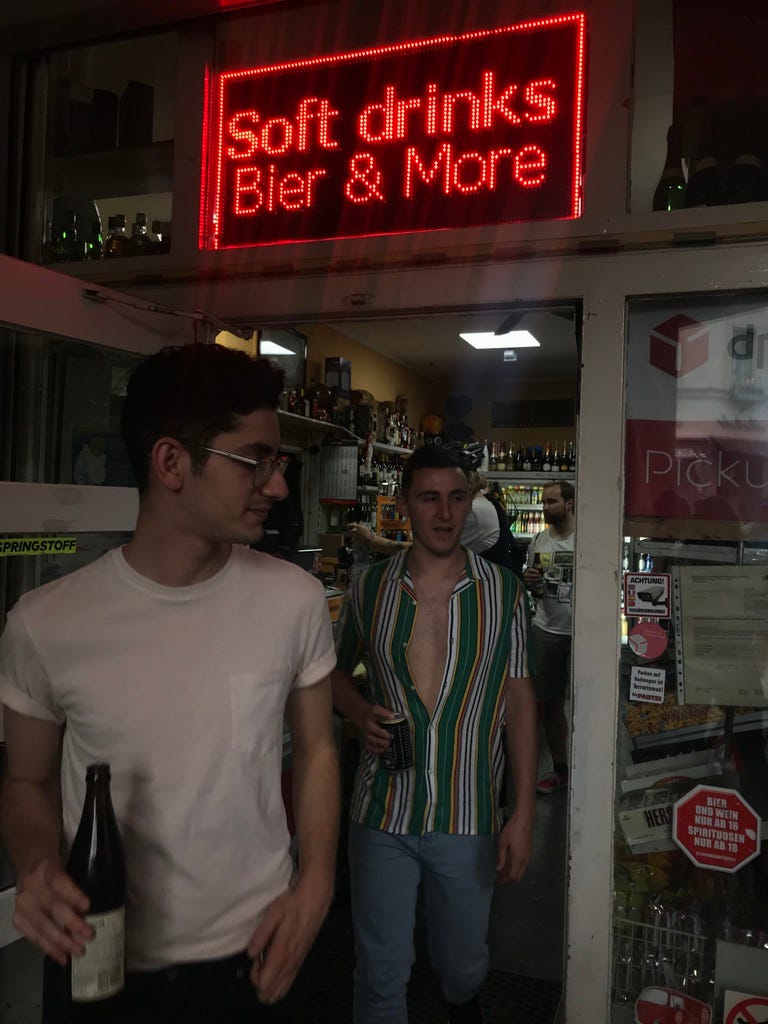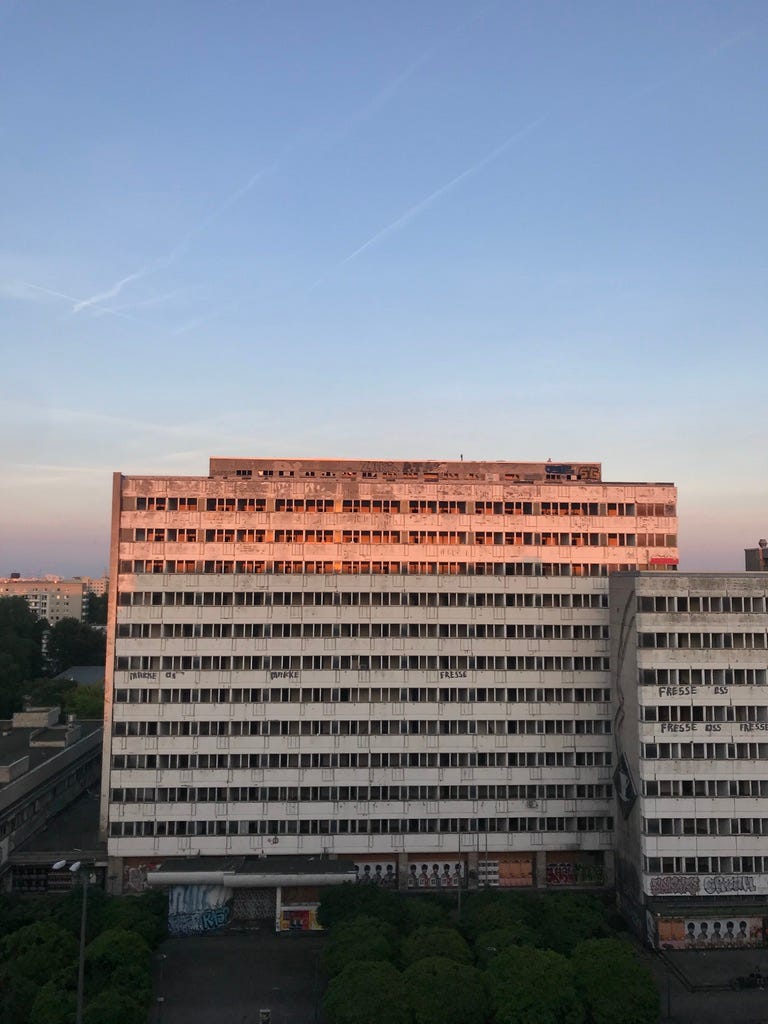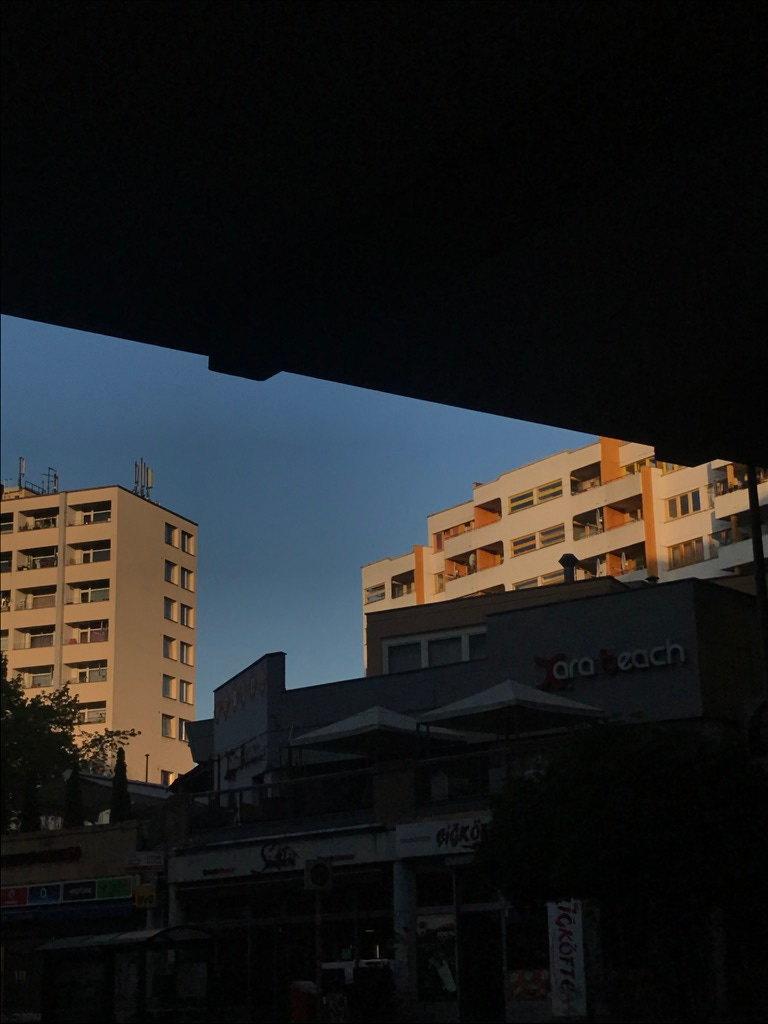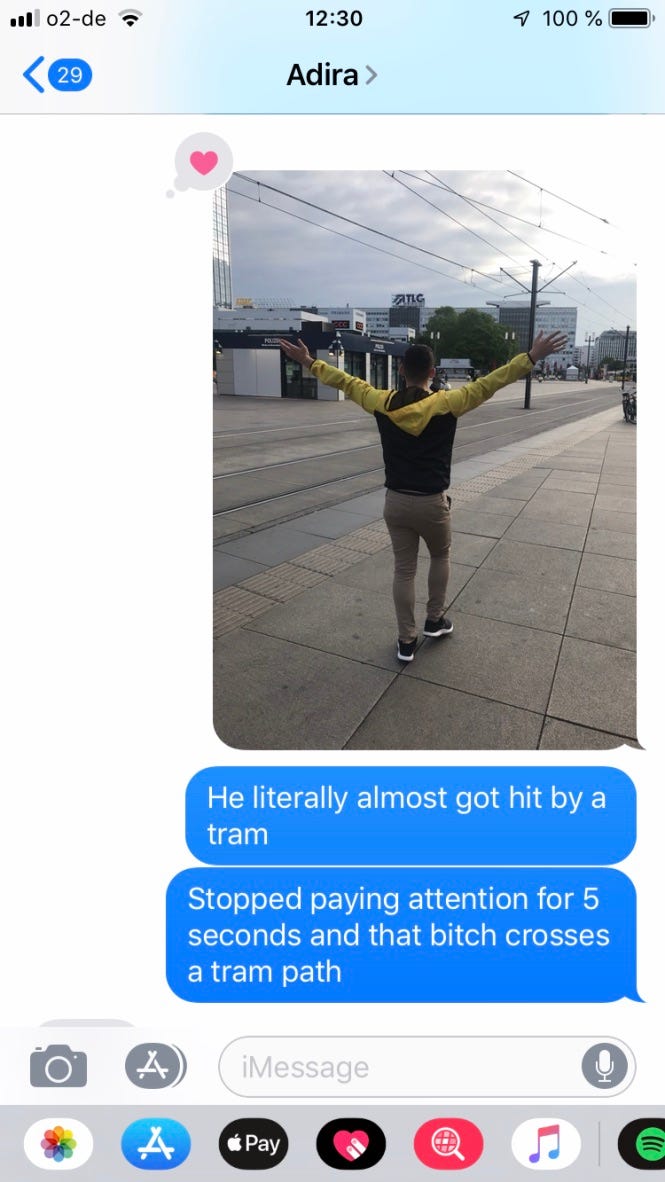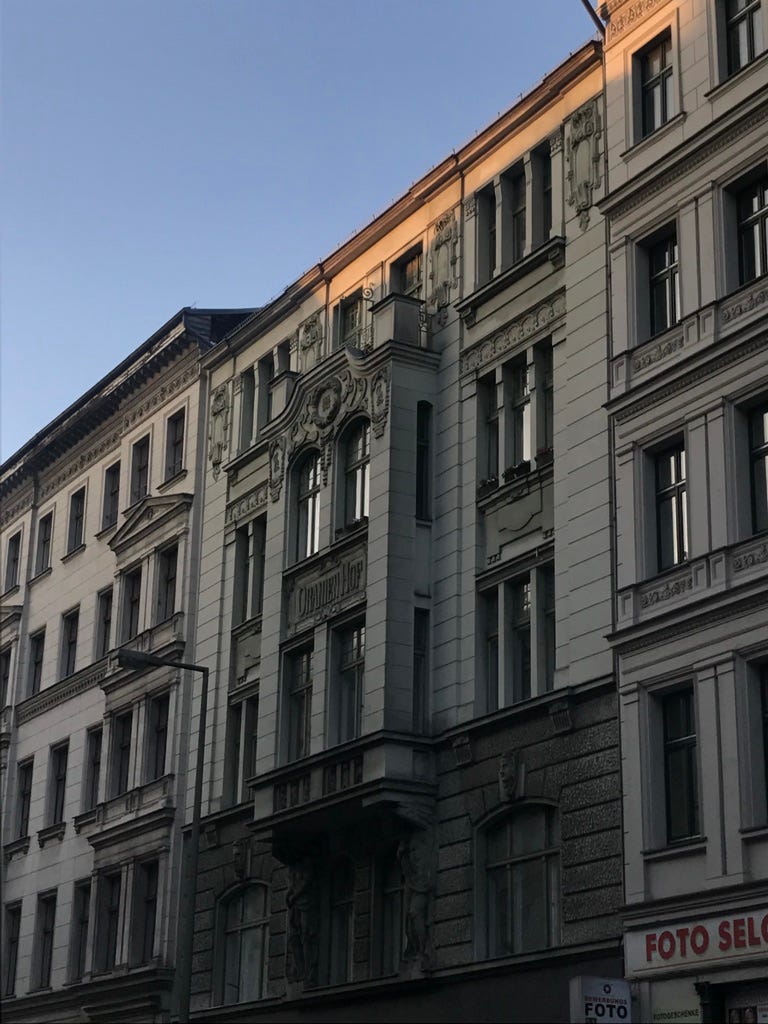In other bars, cigarette smoke would have plumed out the front door when you opened it. But in Roses, the blue fog stayed stagnant. It lingered thick and your eyes took a minute to adjust to the hazy filter. It was a queer bar, a familiar-enough place. But I had never seen anything quite like Roses before. The walls were covered in red fur and the ceiling was tufted red latex. Some disco balls turned, some just hung limp. The chandeliers may have held actual candles, I can’t remember for sure.
Will had suggested Roses for one last drink before heading home. (Home being the hotel near Alexanderplatz.) We were leaning hard into our cliché American maxim that cigarettes and carbs and sins didn’t count in Europe. Particularly not in Berlin. So of course it was never really going to be just one last drink.
We took a spot in the corner. Will got the drinks. Or maybe Nick did. It could have been me. We had been friends for years and it didn’t matter who bought the rounds. It all evened out eventually. We were talking about what we had done that day (DJ set at a nude sauna) and what we were going to do the following day (Holocaust memorial) when a guy with thick-rimmed Wayfarer-type glasses and a mess of bleached, curly hair leaned into our conversation and asked if we could help settle a bet. Sure we could.
He pointed to a lump beneath the skin of his palm and asked if we saw it. Sure we did. He asked us to feel it, so we did.
“Do you feel that?” he asked in an imperceptible accent.
“Of course we feel it. It’s a lump.”
He leaned towards a girl sitting on a couch behind him, exclaimed, “Ha! Told you so!” and turned back towards her. But one of us said, “Wait, you need to tell us what that is.”
The guy smirked and pivoted back around. “Well, a few weeks ago,” he explained, “I was at a party and I was holding a wine glass. Someone said something that made me quite angry and I crushed the glass in my hand.” But because he was drunk, he hadn’t cleaned the wound properly and now, he thought, that little bump was a piece of glass stuck beneath his skin. “But my friend,” he motioned to the girl on the couch, “didn’t believe me.” She laughed in a heavier accent, “Eet ees not possible!” and we laughed back. The guy introduced himself as Rocco. She was Giorgina.
She had long brown hair, a black cotton mini-skirt and black Vans. Sitting next to her was a guy cultivating a John Lennon look, with round wire-frame glasses, feathered hair and an oversized army jacket. They were all Italian (that was the accent), living in Berlin and working for start-ups. They’d been in the city varying amounts of time, a few months or a few years.
We began that friendly drunk-foreigners-meeting-abroad script. When I said I was a writer, Rocco started going off about Camus. He was reading “The Stranger.”
“Oh, great book,” I nodded.
“Is it? I don’t get it,” he pouted and thrust out his hands. Proper Italian gesticulation. “Tell me why it’s so great. It seems, I’m not sure, pointless?”
“Why do you say that?”
“I like reading to learn. I read about technology, science, engineering. I learn to manage a computer program. I understand how the world works when I read these things. But this…there’s no point to it. What do I learn about the world from Camus? All I learn is that you should cry when your mother dies.”
“I don’t think Camus intended it to be read like a manual. You could just read it as a story.”
“But what do I learn from stories?” Rocco almost pleaded.
Suddenly, Giorgina bounced out of her seat and yelled, “Who eees-a doing shots with me?” We raised our hands like polite schoolchildren. When she returned with a tray of Jaeger, Will, Nick and I looked at each other and laughed, “When was the last time you did Jaeger!?” We puckered our lips and shuddered as the astringent went down.
It’s fairly well recorded that Berlin’s epic party scene came as a response to the city’s destruction during World War II. Healing from that collective trauma was delayed even further by the occupation and Cold War. “Gorbachev is guilty for techno,” the man who started Tresor, one of Berlin’s most famous clubs, told the New York Times.
The ‘90s raves were reactionary, a city finally processing itself. After 40 years under the Stasi, East Berliners were ready to party when the Wall came down. The rhythm of reunification (boom-chik boom-chik) reverberated in the old power stations and air-raid bunkers. No one was policing the large empty spaces of former East Berlin. They filled with exuberant, unleashed bodies. And not many of those bodies were sober.
Thirty years after the fall of the Wall, Roses, too, was full. More bodies than there was free space. The music was a constant thump, but not the depersonalizing kind found in Berlin’s more notorious clubs. There was something almost friendly about it. We kept ordering drinks and lights kept ricocheting off the disco balls. The room clouded with more and more cigarette haze.
Nick started photographing the colorful lasers projecting around the floor. We’d been friends since high school. Then he moved to Chicago, where he met Will, who later became my roommate in New York. Point being: what tied us together was the fact that we had spent the first few years of our adult lives switching cities. We were in Berlin because we had never been to Berlin. It was that point in our twenties (just about halfway through) when gathering new experiences in new places seemed the most important thing we could be doing with our time.
With his white teeth gleaming in the bar light, I felt a surge of love for Nick and took pictures of him taking pictures. “You aren’t allowed to take pictures in heeeeeeeeeeeeeere,” Giorgina chided us, her body dangling from her left shoulder like a captured toy in a claw machine. We laughed, said we had forgotten the rule and put away our phones.
“Oh, bella, you must-a come to this paaahrty with me, you absolutely must,” Giorgina suddenly grabbed my arm and shouted, her gaze swaying a few inches away from mine.
“Now?”
“It is wooonderful! You go into the woods and eehhhhverybody can be who-a-ever they want. You-a forget obligations, anything you must do. Eehhhverybody is free at the paaahrty.”
“Okay, when is it?”
“Sunday afternoon!”
“Ah, I can’t,” I moaned. “I leave in the morning.”
“Bring your suitcase! Go straight-a to the airport from the paaahhrty! You must experience theeese!”
The dance floor was in a clearing between trees, Giorgina said, in a forest just outside of the city. There were DJs all day and nobody thought about anything that wasn’t the party. “You will loooove eeeet,” she kept saying. “Eeet eees all about freedom.”
“That’s the problem with her,” John Lennon interjected for the first time all night. “She thinks a party can be about something. A party can’t be about anything.”
“And why is-a that?” Giorgina shot back.
“It’s just a party!”
“You are so negative,” she responded with a sly smile. “You-a doubt eeehhverything and you have noooo faith. You come on Sunday, too. You will see!”
John Lennon doubted it.
I didn’t know where to fall between the two. Somehow, I agreed with them both. In the months leading to our Berlin trip, I’d been hungry for meaning. Although the harder I searched for it, the further it seemed. I’d been boarding the subway and staring at strangers’ faces, trying to intuit the most painful thing that had ever happened to them. I found myself walking down the street and mouthing the words off billboards. I couldn’t make anything mean anything. But, then again, a book, an advertisement, a party — it only means what we allow it to, I suppose. And the lessons or freedoms we find were likely ones we were already seeking. If we didn’t find it at this party, it would have arrived at the next.
Yet the more I listened to her, the less I believed that Giorgina was talking about freedom. At least not exactly. “Everybody can be whoever they want at the party,” she said. “You forget your obligations, your life.” Giorgina was talking about the ecstasy of escape — or vice versa. To take E or ketamine or whatever the kids are doing these days and lose your brain. But escape is an entirely different matter from freedom. When you’re escaping, you only have to define what you’re running from. Once you’re free, you have to figure out not only what you’re free from but what you’re now free to do.
We split up and danced around the bar, exploring its rooms and people. Rainbow Christmas lights were strewn about and everywhere you looked seemed to hold another campy altar: vintage porn posters or Jesus crucified on an LED cross that lit up red, yellow and blue. We were smoking indoors! We were in a wonderful place! Every thought was coming up Roses.
Then we met these Brazilians who wanted to go to another club. A guy from Cote d’Ivoire wanted to tell me about his mother. Will was trying to get some random guy off his lap. The guy kept sticking euro in Will’s front pocket, telling him to go get another round and Will kept saying “I’m good, I’m good” and the guy kept saying “yes, yes you are” and Will kept backing away but the guy’s fingers kept reaching for his pocket. We caught each other’s eye and yelled,“Wanna get out of here?”
When we walked to the front room to say goodbye to the Italians, Giorgina was passed out on the couch, head in John Lennon’s lap. The lights in the disco balls kept flashing. The candles in the chandeliers had melted.
“Is she okay?” we asked.
“Yeah, she’s fine. She does the same thing every week. We’ll get her home.”
We woke her to say goodbye and ask if she was okay. “Yes yes yes, goodbye,” she half-waved and closed her eyes again.
“Be careful,” Rocco warned us on our way out. “Berlin will ruin you. I used to be a normal member of society before I moved here. Now look at me.” He smiled a lonely smile as he gestured to himself.
And then, it seemed quite suddenly, we were in a quieter bar up the road and we were talking about childhood family dynamics and old friends who had overdosed and when we looked outside, the sun was above the buildings.
We just missed the U-Bahn back to Alexanderplatz, so Will and Nick and I stepped back outside to smoke a cigarette between trains and watch the morning turn on. Moritzplatz shifted from all-night kebab eaters to daytime efficiency and the A.M. people started to put the city right. If we lived in Berlin, our bodies would crumble within two weeks, we joked. How was it 7 a.m. already? As we were laughing, a guy about our age emerged from the station. We asked if we had missed the train. We had.
He was dressed oddly formal for the end of his night (and it was definitely the end of his night, his eyes couldn’t really focus): a silk dress shirt, slim black trousers and lace-up brogues slick with cultural capital. He asked us for a cigarette and we started talking. He asked where we were from and we explained that we were from this city but via that city blah blah Americans abroad. We asked the same of him and he said he was from New York and Miami. We asked what he was doing in Berlin and he said, “Oh, you know, just living, I suppose.” The next train rumbled underground but we didn’t run to catch it.
Within 10 minutes of meeting him, we knew the guy was Jewish because he told us so. I suppose it must have been impossible to avoid thinking about it in Berlin. He had studied opera at a small college somewhere in Florida but also computational mathematics somehow? His nose was sharp and long, and the bones of his face were hard like a bronze cast. His eyes darted around, looking at everything, but it was unclear how much he actually saw. His fingers never stayed still.
“He’s on drugs? He’s on drugs, right?” we communicated the thought through eyebrow arches at each other. “Yeah, but which ones? Do we join?” We continued talking to the guy for some inexplicable reason. I think that’s just what Americans in Europe feel they’re supposed to do for each other. We wandered into a kebab shop where Will bought three water bottles and distributed them. Maybe Nick did. I don’t think it was me.
The guy was saying some fascinating stuff (his mother lost all their inheritance when he was growing up, they were flat-broke heirs) and he was funny in that half-unintentional way. He talked about the heat in Florida, his mother’s place in Westchester, the opera scene in Berlin. He was having a hard time booking gigs but also, he said, he had kinda given up trying.
“Ah, those are my friends,” he pointed to the windows of a dark, purple room above a corner store where a disco ball flared and bodies danced like they weighed nothing. “They’re still up there. That’s where I just came from. Do you want me to see if I could get us in?”
“But you just got off of the train?” we responded, neither statement nor question.
The streets filled with men in suits. There was a giant billboard advertising the same Calvin Klein underwear they advertised on billboards back home. Birds swooped down to the sidewalk to snatch fallen kebab.
The guy asked how much longer we were going to be in Berlin. We told him a few more days. We asked where he was headed and he said, “I’m just waiting for the hospital to open so I can get my medication.” We changed the subject.
He decided to take the train back to Alexanderplatz with us.
“Okay, but we can’t let you into the hotel,” we said. “What are you going to do?”
“Oh, I’ll figure out something,” he said with a smile, not sinister but detached. As if he was already looking at the future with fond nostalgia. He mentioned something about Derrida and it sounded right. He was probably, actually, really smart. Abruptly, he decided to head in the opposite direction.
We wrote our numbers on an old business card because the guy didn’t carry around his phone or it was dead or something. Then he said goodbye and turned on his heel to catch the next train.
We tried to reassure one another that the guy was going to be okay, that we couldn’t have taken him back to the hotel, that there wasn’t much more we could have done for him.
“Do you think he’ll call us?” I think I asked.
“I doubt it,” Will probably responded.
“I kinda liked him,” Nick might have added.
“Yeah, me too. Even though he was clearly lying about everything.”
“Do you think we would end up like that if we lived in Berlin?”
Back at the hotel, as sunlight poured through the slim doorway, the inevitable headache began to flash into my skull. I’d never know what Giorgina’s party was about—whether freedom was a theme on the flyers or only in her mind. But I had the feeling that it didn’t make much difference.
It didn’t matter if the wall fell or if your mother died. If you chose to cry or went to party. Life was not a game of imbuing meaning into jaegerbombs and billboards. I was growing out of the conviction that stories could, after all, teach us how the world works. The cigarette smoke stays stagnant. The morning people put the city back right. It doesn’t matter who buys the rounds. We’re all just living, I suppose.




